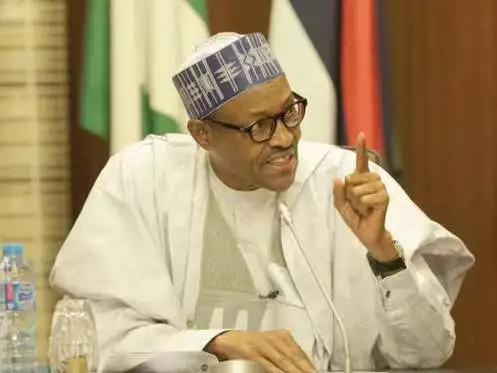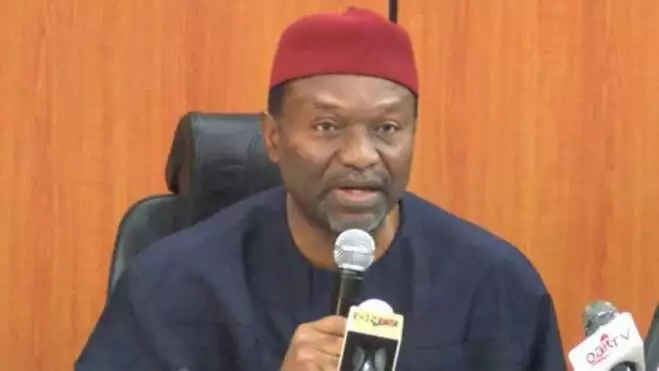Kemi Adeosun, minister of Finance appears to have put a close tab on statutory agencies to improve on government revenue generation as the amount shared by the Federal, states and Local governments in the month of April drops.
There are fears in both official and unofficial circles that the situation may not change for the better in subsequent months despite the increase in the price of a barrel of Crude Oil in the International Oil market unless the statutory agencies remit the operating surplus to the Federation account as expected without waiting for the ministry of Finance officials to run after them with caps in hand begging as was the case in the past.
The government had set a revenue target of N886 billion for the statutory agencies this year. The amount excludes the remittance of the Nigeria National Petroleum Corporation, NNPC, Nigeria Customs Service, NCS, and the Federal Inland Revenue Services and FIRS, known in official circles as the traditional government revenue generating agencies .
The revenue target may have put much pressures on these agencies including the traditional revenue generating agencies as they struggle to block areas of revenue leakages to meet the its monthly revenue expectation to lubricate the economy and meet the growing financial needs of the three tiers of government: Federal, states and local governments.
The Magazine learnt that since Adeosun, the minister of Finance stepped up the government revenue drive, there had been an intense competition among the government statutory agencies to remit revenue into the Federation Account to be in the good book of the minister as a performing agency. This is evident going by the amount that was said to had been remitted by the Nigeria Communications Commission, NCC, to the Federation Account between January and April 2018.
The remittance into the government coffers may have emboldened the agency to speak out . ”In compliance with the fiscal Responsibility Act of 2007, FRA 2007, the NCC, had remitted about N49.8 billion into the Federation Account, thus joining the league of government statutory revenue generating agencies.

Many believe that the NCC may have turned from a revenue defaulting agency to a revenue generating agency with the appointment of Umar Garba Danbata, as the Executive Vice Chairman by President Buhari in August 2015. to replace Eugene Juwa, whose tenure expired on July 29, 2015. Danbata was said to have started well by blocking areas of revenue leakage in the agency, thus making it possible for the Organization to remit its operating surpluses to the government monthly as required by law.
Danbata may have given a good signal to the ministry of Finance within his first year in office when the Commission made a remittance of N32.35 billion into government that it was ranked among the agencies that had turned a new leaf like the Nigeria Securities and Exchange Commission, SEC, Nigeria Tourism and Development Corporation, NTDC, National Maritime Administration and Safety Agency, NIMASA and Nigeria Ports Authority.
The government revenue drive may have forced NPA, which over the years had been collaborating with officials of Integrated Logistics Services, INTELS , to deny the government the revenue it was supposed to remit into its coffers to pay $28.1 million debt owed the government. That much was confirmed by Hadiza Usman, Managing Director of the Authority, stressing that an additional $14.5 million is awaiting official confirmation. The NPA boss confirmed that the total amount that had so far been paid by the Company to the government through the agency was $42..6 million.
There is no gain saying the fact that rush by government statutory agencies to meet their financial obligation to the government has made more money available to be shared by the Federal, states and local governments.
This is evident going by the money that had continued to be shared by the three tiers of government since last year and now. In April, 2018, alone, the three tiers of government was said to have shared N626.8 billion.
Ahmed Idris, the Accountant General of the Federation, AGF, disclosed that the sharing of the amount was a fallout of the meeting of the Federal Account Allocation Committee, FAAC . Given an insider information, the AGF, confirmed that N480.59 billion was received as gross statutory revenue from NNPC, NCS, Central Bank of Nigeria and other revenue remitting agencies.
Last march, the total amount that was said to have been approved for the three tiers of government to be shared was said to be N557.94 billion by Idris, the AGF, showing a drop of N77.34. He attributed the drop in revenue shared in the month of April to the decrease in Crude oil export sales to trading partners in the Asian country of China, Europe and the United States of America, USA. The AGF, confirmed that the country’s Crude Oil export sales dropped by 13 percent when compared to the 5.42 million barrels exported in the month of March.
The revenue realized within the period from Oil exports was said to have dropped by $33. 58 million. According to him, the drop in Oil exports was not unexpected because of the ”Shuts- ins and Shut- downs at various terminals across the Niger Delta for repairs and maintenance”.
The revenue from the Oil sector could not have fared worse as the price of a barrel of Oil, Nigeria Bonny Light . in the international Oil market increased from $63.08 to $65.72 .
He said the three tiers government even had good revenue to share in the month of April because there was ”considerable rise in oil royalty payment by the Oil Producing Companies. This is in addition to the marginal increases recorded in Companies Income Tax, CIT, Value Added Tax, VAT, and Import Duty.
A good source of revenue that that the government had banked on to give a boost the amount that was shared in the month of April was the payment of Petroleum Profit Tax by the Oil Companies but the PPT payment was said to be a disappointment. ”There was a significant drop in income from PPT”, the AGF said.
There are fears that there may not be any improvement in revenue generation and amount shared by the three tiers of government for now because of the slow growth of the economy. Udoma Udo Udoma, the minister of National Planning painted the gloomy picture of the economy when he confirmed at a recent World Bank meeting that the ”rate of Nigeria’s economic growth is still very slow”.

The minister lamented that the country’s problem for now is not ” debt settlement or rescheduling with Creditor nations but a revenue problem. It is not surprising why Adeosun, the Finance mister, is focused on generating more revenue for the government.
As part of the government efforts to improve on its revenue generation and put more money in FG, states and Local governments coffers, it was learnt that the government is trying the tax amnesty option and increase the tax revenue being generated as well as well as reviewing the list of Companies paying excise duties . This is evident with the review of the rates and bases for excise duties on alcoholic and beverages.
A source in ministry of Finance informed the Magazine that it was communicated to Hameed Ali, a rtd Colonel and Comptroller General, Nigeria Customs Service, NCS, on March 6, 2018. The Law, according is to become effective from June, 2018.
The new excisable duty regime for alcoholic, beverages and tobacco products currently the only excisable items in the country is an indication of a shift from advalorem specific rate taxation on for beer, stout, wines and spirits.
Insiders told the Magazine that new excise regime was informed by the decline in non oil revenues, revenue leakages and to control consumption of foreign goods.
The government had set the country’s economic growth rate at seven percent by the year 2020 to be Comfortable in running the country without borrowing from both local and foreign Creditors. Udoma, the National Planning minister disclosed that the government is working hard to ensure that the ”economy pick up”. He maintained that they are ”poised to continue focus on the various measures to accelerate growth and generate more revenues.
Discover more from The Source
Subscribe to get the latest posts sent to your email.







